
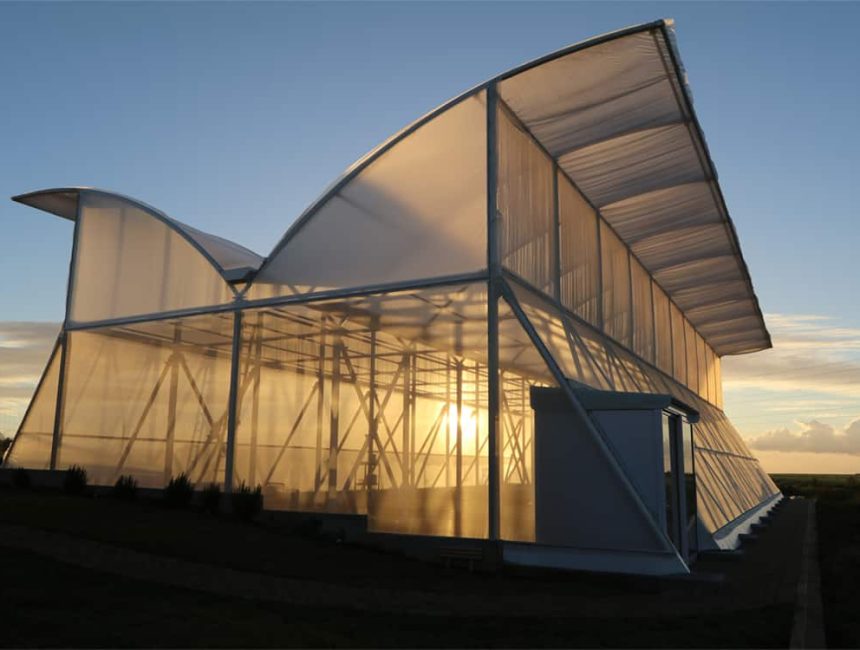
More riches from Mauritius, the self-evidently ever-verdantly encrusted Indian Ocean isle where Farmcity’s innovators are weaving wonders with AutoPot Watering Systems. This month we soared there at the speed of sound on an all expenses paid Skype call and tour to review their progress.
At Farmcity’s TropicBird greenhouse growing continues apace. Abundant, mild and highly-resistant F1 cucumbers, large and juicy-yet-solid Santa Clara tomatoes and time travelling cyborg TM 1988 tomatoes each currently revel in 156 pots apiece. Meanwhile beguilingly purple Brinjal, mildly-peppery and stunningly healthy Bok Choy (x4 per pot) and earthy, nutty Amaranth are each receiving the entirely welcome attentions of another 78 pots per variety. These are luxuriating in the tried and tested substrate of coco coir and perlite with a clay pebble layer in the base.
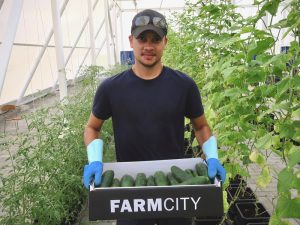
Farmcity find that the best way to keep this produce affordable is to sell direct to public. For now, they are working with different organisations (a church, a school and a cafe) to have sales points where they can ‘set up shop’ for a few hours so that their customers can pick up their weekly supply of vegetables. In the future, when Farmcity have enough supply from both their own farm and their partner farms, they plan to have a dedicated shop front. They also have plans for a mobile shop (by retrofitting an old school bus) so they can truly increase access to healthy vegetables for everyone.
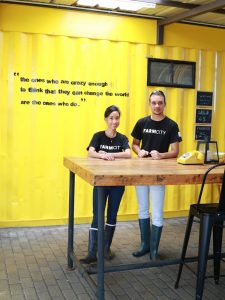
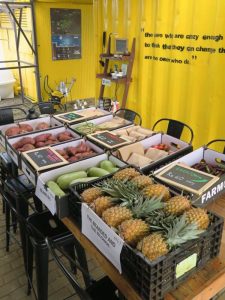
Substrates, seeds and fertilisers are a constant logistical challenge on an island such as Mauritius. Therefore any degree of self-sufficiency has the potential to significantly ease Farmcity’s workload in future. In the long run Farmcity intend to build a seed bank. This will afford them some self-sufficiency in
seeds, not 100% but perhaps 25% as an initial and achievable target. Most of the seeds available locally are F1 varieties so cannot be saved. The first step in creating the seed bank will be sourcing open-pollinated seeds and bringing them to Mauritius. Once Farmcity can set up a reliable supply, they can look into growing them on the farm and reserving part of the harvest for seeds. Furthermore, as they scale the business and bring onboard more partner farms, Farmcity hope to encourage their partner farms to save and pool their seeds, providing greater variety.
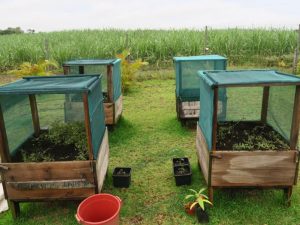
Farmcity Directors Kelly-Ann Yeo and Wesley Oxenham also plan for an eventual 50% self-sufficiency in compost. To these ends they started composting with 200 worms in one bin, and are now onto their second. The current focus is to grow the population of red wrigglers so that they can produce vermicompost at scale. The worms are fed with green waste from the TropicBird and also kitchen waste. The potting mix that Farmcity will change out every year will go into their compost maker together with larger waste from the landscape around the greenhouse. Any green waste will be channelled into vermicompost or vegetal compost for use back in the greenhouse.
From the outset, necessity and a desire to farm sustainably have dictated that Farmcity Mauritius are completely off-grid (for both power and water). Where water is concerned a 4000L rainwater tank has the capacity to comfortably quench the thirst of the TropicBird. Thanks to the TropicBird’s innovative design all this rainwater is captured from the greenhouse roof and can fill the tank in just 15 minutes. The local levels of rainfall are such that a 9000L tank is planned for the near future, meaning extra water that could be captured from the roof isn’t lost.
The AutoPot Watering Systems used by Farmcity require no power at all. But for tasks such as pumping rainwater from the
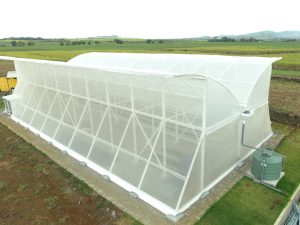
collection tank to their FlexiTanks or hand watering seedlings with a hose some electricity is required. Solar panels provide 2.5kW of power, which is usually more than enough for these needs. However, during cyclones or consecutive bad weather days where light levels are low, they do have a diesel generator backup that they can use to charge the batteries for their solar panels. For future greenhouses they envisage raising the base of the rainwater tank so that it can fill up the FlexiTanks by gravity.
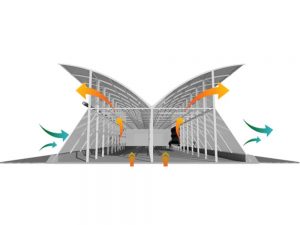
Passive ventilation systems, which require no power and which are inherent features of the TropicBird’s design, serve to keep the heat of the greenhouse in check. This built-in cooling also greatly reduces the penetration of insects and pests as opposed to simply opening panels or windows. Elsewhere pest control methods are mostly preventive. Entry to the TropicBird requires a change to greenhouse-use-only footwear and use of hand sanitiser. Neem oil solution is deployed as foliar spray once every two weeks and food grade Diatomaceous Earth is used on the greenhouse base to deter ants. Farmcity solarize all their substrates before they are added to the pots. The coco-perlite mix that they use is simply left in the sun to bake in its individual bags for about four weeks to kill any pathogens, pest or weed seeds that may still be present.
The TropicBird greenhouse is currently attracting attention from a diverse range of potential partners. Schools who want to grow their own supply of food for the cafeteria are looking to integrate a TropicBird on campus. Supermarkets looking to secure their own supply of vegetables are expressing interest in placing the greenhouses on their rooftops. Even property developers are looking to include the Farmcity model as part of their development. It is a very exciting time for Farmcity to see so much interest from only their first prototype.
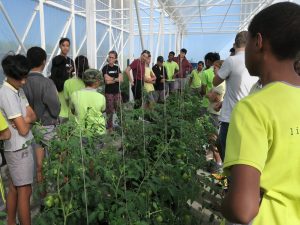
Although warmly received Farmcity’s approach is considerably different to the established horticultural route taken on the island. Mauritius has many small-holding farmers who are older and who have farmed the same way for decades. The prevailing attitude is that you can either be profitable (grow in bulk, price low and sell to the middlemen/supermarkets) or have social impact, but not both. Some of these senior farmers see farming as an extremely hard life and one they do not want their children to experience. Thus they have encouraged their children to seek careers away from the land as lawyers, doctors or in an ‘office job’. The question of whether the current food production and distribution systems are fit for purpose may not occur to farmers who take the view that farming is, or was, merely a means to an end. If farming has served its purpose for them then they are perhaps less likely to seek change. If farming has failed them then they have looked elsewhere. This is not to say that there aren’t any current farmers who want to see positive changes.
A younger generation of farmers (not in terms of age so much as the number of years in farming) is emerging. Most of these are ‘future farmers’ – individuals returning from abroad who are taking over the family farm but also responsible for caring for their ageing parents. These future farmers need an easy to operate farm. They do see the value in the Farmcity Model in their commitment to both sustainable, natural farming and making good food accessible. Providing support, hands-on experience and education for these new farmers and farmers of the future are all part of Farmcity’s stated aims. To these ends they welcome in volunteers seeking experience and youth groups. Recent visits from the local Lighthouse School have illuminated the innovative growing techniques that Farmcity employ for a whole new generation of potential horticulturalists. Promoting the viability of sustainable farming has been helped no end by the fact that consumers are increasingly demanding better, healthier food at affordable prices. There is real hope that this demand will drive mindset change around farming.
| Monday | 9AM-5PM |
| Tuesday | 9AM-5PM |
| Wednesday | 9AM-5PM |
| Thursday | 9AM-5PM |
| Friday | 9AM-5PM |
| Saturday | Closed |
| Sunday | Closed |